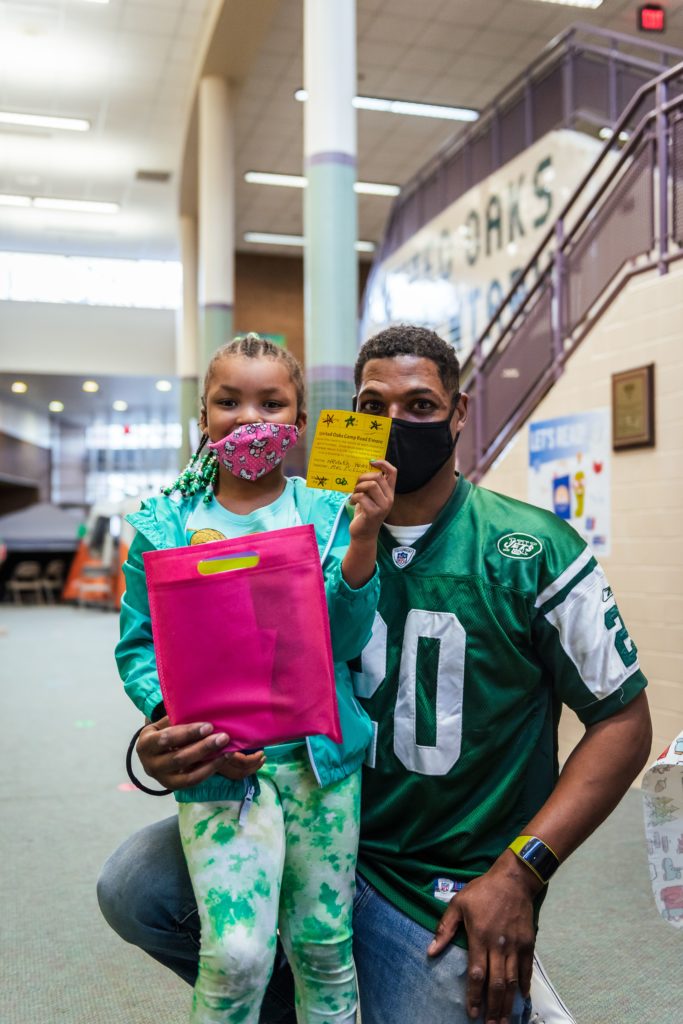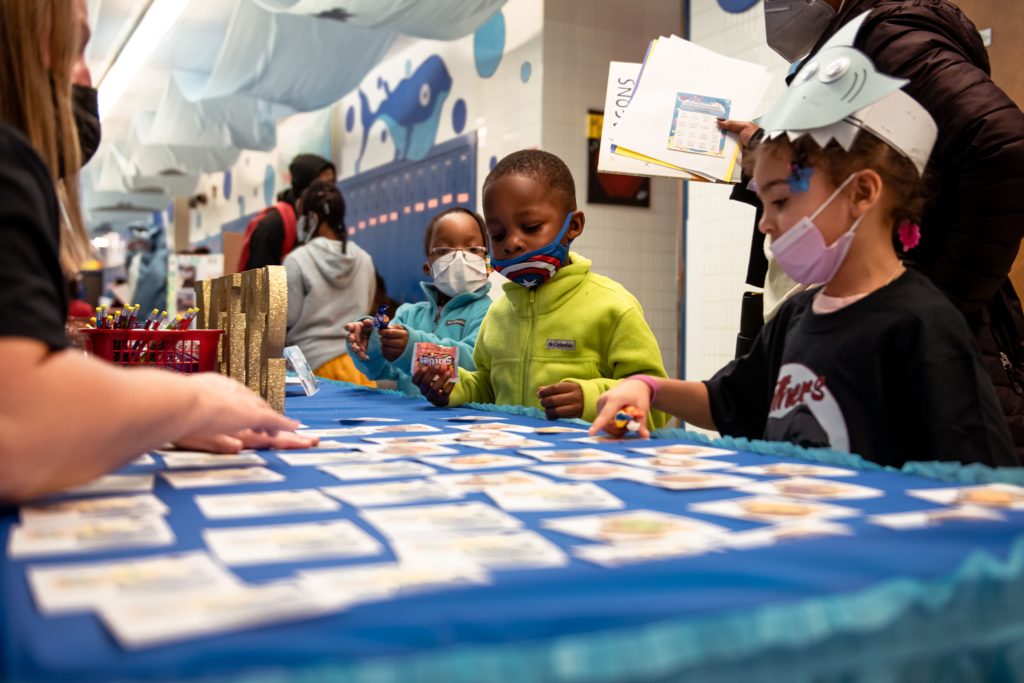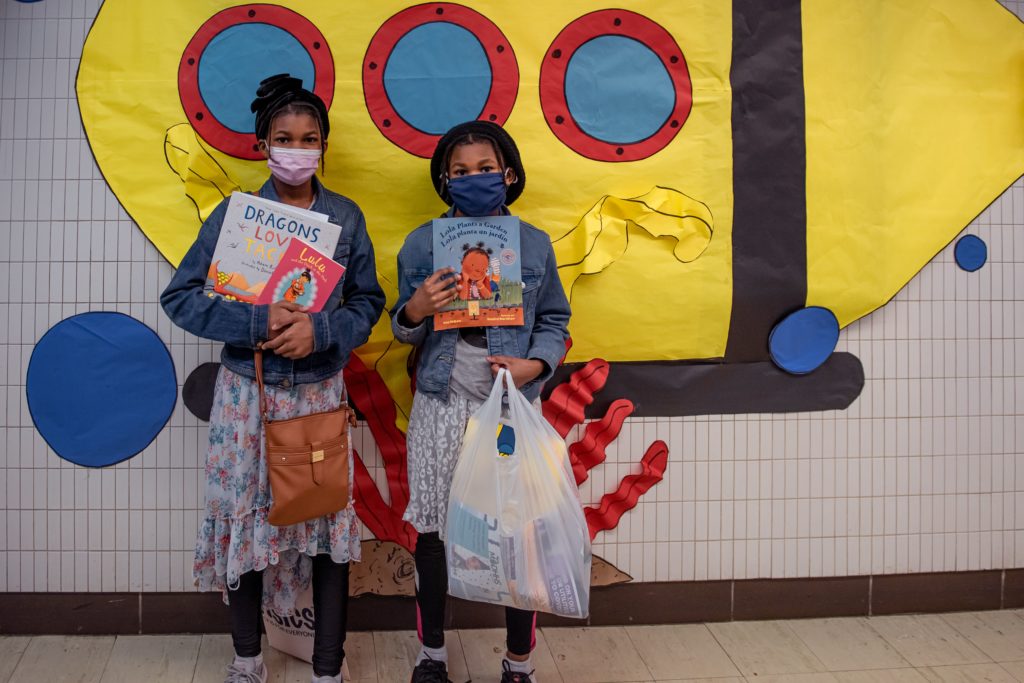Students Read More Than 20,000 Books in March Through Read United
Published on April 13, 2022 in Literacy

Nevaeh Howell’s second grade class erupted in giggles as her dad, Michael Howell, joined a Zoom call to read her favorite book, “I Need a New Butt!” by Dawn McMillan.
“A butt as bright as dad’s underwear,” Michael read aloud, trying to contain his own laughter. He’s a dedicated dad who will do anything for his daughter. Before joining Nevaeh’s class as a surprise reader, the pair attended a recent literacy night event at her school in Hazel Park.
“Whatever I can do to put a smile on her face and put her in a better position for the future, I’m down for it,” he said.
Michael understands the importance of early literacy. Before Nevaeh was able to recognize words, he would read her bedtime stories.
“Now she’s reading to me,” he said. “I love it.”
United Way for Southeastern Michigan strives to create a region that fosters a rich culture of literacy, regardless of socioeconomic status. This includes increasing access to books, supporting programming that builds strong literacy skills, encouraging a love of reading and advocating for equitable resources in communities that need them most.
To honor National Reading Month in March, United Way for Southeastern Michigan encouraged literacy through volunteerism and events, including our inaugural Read United initiative. Thirteen schools, including our five Community Schools in River Rouge, Southfield, Hazel Park and Pontiac, participated in Read United. The students read more than 20,000 books.
The initiative also so far has raised more than $21,635 to put even more books into the hands of students, thanks to generous donations from Bosch, The Lyall Family, PNC Bank and DTE Energy. It was also supported by United Way’s Campaign Cabinet members, who helped plan and execute the event.
Everyone is a Winner

As part of the initiative, schools received packets of printed materials to track their reading progress throughout the month. Students were challenged to set personal goals and compete with other classrooms to become the Read United champion. Teachers also received a box of prize items that included including books, toys and other small giveaways to incentivize and reward students as they read their way through March. All participating students also received a ticket to either a Detroit City FC or United Shore Professional Baseball League game.
Activities included fun games like Reading BINGO, as well as writing and illustration prompts to get kids thinking creatively. Quincy Smith, a third-grader at Adler Elementary School in Southfield, wrote the winning story.
“The students were very engaged in the challenge,” said Nichole German, principal of Ann Visger Preparatory Academy. “They love the competition element. Anytime we can get students to be active participants in learning, it’s a win for everyone.”
Visits from surprise classroom readers, including Lt. Gov. Garlin Gilchrist, elevated the excitement for students. UWSEM president and CEO Dr. Darienne Hudson also got in on the fun — recording a live reading of Ada Twist, Scientist. Roary the Lion, official mascot for the Detroit Lions, scored big smiles while visiting several schools to cheer on students and teachers, too.
Next year, United Way hopes to expand Read United to include more schools and offer more opportunities for families to participate with their kids.
The Foundation for Everything Else
“Literacy is the gateway to opportunity and the promise of a better tomorrow,” said Ellen Gilchrist, senior director for K-12 education and community at United Way for Southeastern Michigan. “History has shown us that when literacy is suppressed, the potential of people is squandered.”
“This is especially true with our most vulnerable communities — our communities of color, rural communities, immigrant communities and our most economically fragile.”
Sixty-one percent of low-income families do not have any books in the home, according to the U.S. Department of Education. These children are, on average, three years behind children who grow up in homes with lots of books, even when controlled for other key factors. In our region, many cities are categorized as “book deserts,” meaning most homes have fewer than 100 books. This makes it difficult for children to get ahead.
The most successful way to improve reading achievements of low-income children is also the simplest — increase their access to print. As part of United Way’s commitment to thriving children, we’re working to eliminate the barriers of access to books to create a more literacy rich, reading-proficient region.
“Children who have access to plenty of books are more proficient readers,” Ellen said. “The beauty in Read United and other literacy initiatives is that there’s space for everyone to contribute and have collective impact.”
Making Reading Fun

Literacy night at Ann Visger embraced an “Under the Sea” theme with colorful characters, storytellers, movies and plenty of water-themed activities for kids.
The event brough a welcome change of pace for nine-year-old Kamiya Gross and her sister Kaliyah Benton, 10, who have opted for virtual school since the start of the pandemic.
“It’s fun to see my friends and watch a movie with them,” Kamiya said, as the pair sorted through a table of free books offered by the River Rouge Public Library. “I like that we get to take the books home.”
The girls’ mother, Cedisha Gross, said both students have struggled with reading and math. She added that support from the literacy coach, made possible through United Way’s Community Schools initiative, has been particularly helpful in keeping them all on track.
To increase literacy rates at Ann Visger and in the surrounding community, Nichole and her staff are making it a point to infuse literacy into every activity during March and beyond.
“Without a strong foundation of literacy, it’s impossible for students to thrive in other areas,” Nichole said. “In the same vein, it’s impossible for students to thrive when their basic needs — things like food and shelter, and their social and emotional needs aren’t being met.”
“As a Community School, we’re able to wrap our arms around the students and their family to ensure every need is met.
“That’s why I love the partnership with United Way. It’s opened so many doors for our schools and our students.” It’s not too late for families to get in on the fun of Read United. Download free templates and create a custom reading challenge for your home or classroom today. You can also still donate to help us keep up the great momentum for Read United and literacy.